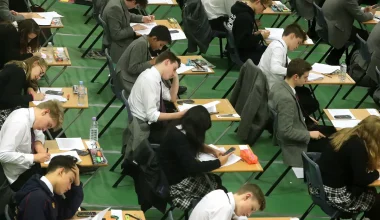In the UK, once a child approaches 17 Years Old , talks about future plans starts coming up. It can be an anticipated moment, but it’s filled with a lot of questions about what the future holds which one of such questions revolves around leaving education. So, you may ask what happen if your 17-Year-Old child leaves education in the UK? Are there negative effects to it?
As important as education is, it has numerous benefits if your child chooses to advance to higher institution for further studies or pursuit of a professional career. However, there are many paths to success, and the decision to leave school at 17 may not necessarily mean derailing from their future.
In this writing, we will look at what happens if your 17-Year-Old child decides to leave education; its potential benefits and challenges, and how to have an informed discussion with your child if he is considering leaving education.
Table of contents
The UK Education System
If you’re a parent in the UK, it’s important to understand the education system to ensure that your child receives the best possible education. Here are some key things to know about the UK education system:
According to the UK Education Hub, education is not only a legal requirement but is also seen as the foundation for a brighter future. The system is designed to provide young individuals with the skills, knowledge, and qualifications they need to pursue their dreams and contribute to society.
However, there are instances when a teenager may choose to exit the traditional educational route, either due to personal reasons, differing career aspirations, or struggles with the academic environment.
Compulsory Education Age
In the UK, children are required to attend school from the age of five until the end of the academic year in which they turn 16. This is known as compulsory education. After this point, they may choose to continue their education or pursue other options.
Post-16 Options
There are several options available to young people in the UK after the age of 16. These include:
- Full-time education: This can include studying for A-levels or other qualifications at a sixth form or college, or attending a further education college to study vocational qualifications or apprenticeships.
- Apprenticeships: Apprenticeships offer young people the opportunity to learn a trade while working and earning a wage. They typically involve a combination of on-the-job training and classroom-based learning.
- Traineeships: Traineeships are similar to apprenticeships but are aimed at young people who may not yet have the skills or experience to secure an apprenticeship. They typically involve a period of work experience and training to help young people develop the skills they need to succeed in the workplace.
- Employment: Some young people may choose to go straight into employment after leaving school. This can be a good option for those who have a clear career path in mind or who are keen to start earning money.
What Happens if My 17-Year-Old Leaves Education in Uk?
If your 17-year-old child decides to leave education before they turn 18, there are several consequences to consider.
Legal Implications
In the UK, the official school leaving age is 16, but it is necessary to remain in some form of education until you are 18. If your child decides to leave education at 17, they may be breaking the law. You may face legal action if your child is not in education, employment, or training (NEET) between the ages of 16 and 18.
Impact on Employment Opportunities
Leaving education at 17 may limit your child’s employment opportunities. Most full-time jobs require employees to be at least 18 years old. Without a high school diploma or equivalent qualification, your child may only be able to find low-paying jobs. This may impact their ability to support themselves financially and lead to a lower standard of living.
Effects on Future Education
Leaving education at 17 may also limit your child’s future education opportunities. Without a high school diploma or equivalent qualification, your child may not be eligible for further education, such as college or university. This may limit their career options and earning potential
Financial Implications
If your 17-year-old child decides to leave education in the UK, there are several financial implications to consider.
Benefits and Support
If your child leaves education before the age of 18, they may still be eligible for certain benefits and support. For example, they may be able to claim Universal Credit or Jobseeker’s Allowance if they are actively seeking work. However, if they are not actively seeking work, they may be subject to sanctions.
Additionally, your child may be eligible for support from the National Careers Service, which can provide advice on training and employment opportunities. They may also be eligible for support from their local council, such as help with housing or financial assistance.
Potential Employment Constraints
Leaving education early may limit your child’s employment opportunities. Many employers require a minimum level of education, such as GCSEs or A-levels, for certain positions. Without these qualifications, your child may find it difficult to secure employment in certain industries.
Furthermore, leaving education early may limit your child’s earning potential. According to the Office for National Statistics, individuals with higher levels of education tend to earn more than those with lower levels of education. Therefore, your child may face financial constraints in the long term if they do not continue their education.
Leaving education at 17 can have a significant social and emotional impact on your child. Here are some potential effects:
Emotional Impact
- Low self-esteem: Dropping out of education can make your child feel like they have failed, which can lead to low self-esteem and self-worth.
- Anxiety and depression: The pressure of entering the workforce or finding their place in society can cause anxiety and depression in some teenagers.
- Lack of direction: Without a clear plan for their future, your child may feel lost and unsure of what to do next.
- Regret: Your child may feel regret for not completing their education and worry that it will hold them back in the future.
- Limited job opportunities: Without a high school diploma or further education, your child may have limited job opportunities. This can lead to financial difficulties and a lower quality of life.
- Social isolation: Your child may feel isolated from their peers who are still in education, which can lead to loneliness and social anxiety.
- The strain on relationships: The stress of leaving education can put a strain on relationships with family and friends.
- Risk of substance abuse: Without the structure of education, your child may be more likely to engage in risky behaviors, such as substance abuse.
Please support your child during this time and encourage them to explore their options. Consider discussing alternative education options, such as vocational training or apprenticeships. Also, encourage them to seek out career counseling and explore their interests to find a path that works for them.
Long-term Consequences
If your 17-year-old child leaves education in the UK, it can have long-term consequences on their prospects. In this section, we will explore the potential consequences of leaving education early.
Career Opportunities
Leaving education early can limit your child’s career opportunities. Employers are often looking for candidates with a certain level of education, and without it, your child may struggle to find employment.
In fact, according to the UK government, those with no qualifications earn on average £9,000 less per year than those with at least one qualification.
Furthermore, leaving education early can limit your child’s ability to progress in their chosen career. Many careers require a certain level of education or training, and without it, your child may not be able to progress beyond a certain level.
Higher Education Prospects
Leaving education early can also limit your child’s prospects for higher education. Most universities and colleges require applicants to have certain qualifications, such as A-levels or equivalent. Without these qualifications, your child may not be able to access higher education.
Even if your child is able to access higher education, they may face additional challenges. For example, they may need to take additional courses to catch up on missed education, or they may struggle to keep up with the pace of their peers.
FAQS
A 17-year-old can leave school in the UK, but only on the last Friday in June if they will be 16 by the end of the summer holidays. However, they must engage in some educational training until they turn 18
You have to stay in education or training until you are 18 in the UK. This is the law in England, Scotland, Wales, and Northern Ireland.
If 17-year-olds drop out of college in the UK, they will have to find another way to meet the education or training requirements until they are 18.
You can leave education on your 18th birthday in the UK. However, consider the long-term consequences of this decision. Leaving education early can make it more difficult to get a good job and earn a good salary. It can also make it more difficult to get into further education or training if you decide to change your mind later.
Conclusion
The decision to leave education at 17 Years Old or to stay is totally a personal decision. There is no single right answer. The benefits or limitations of such a decision depend on the child’s strengths, interests, aspirations, and financial capacity as a parent.
What is expected of you is to have open communication with the child, discussing what they stand to gain or lose by the decision to leave education at 17.
Additional Resources
- What is an Exempt Employee? All You Need to Know
- What is Payroll? How to Make a Payroll Very Fast
- What is a Notice Period? Fully Explained
- What is Human Resource Outsourcing? All you need to know
- What is a Recruitment Drive in an Organization?
- What is Seasonal Employment? All you need to know
- What is a Floating Holiday? Office Term Fully Explained
References
- educationhub.blog.gov.uk/ – can you leave school at 16
- gov.uk/ – know when you can leave school
- mirror.co.uk/ – What Happens if My 17-Year-Old Child Leaves Education?
- examinerlive.co.uk/ – what happens if you don’t go to college






